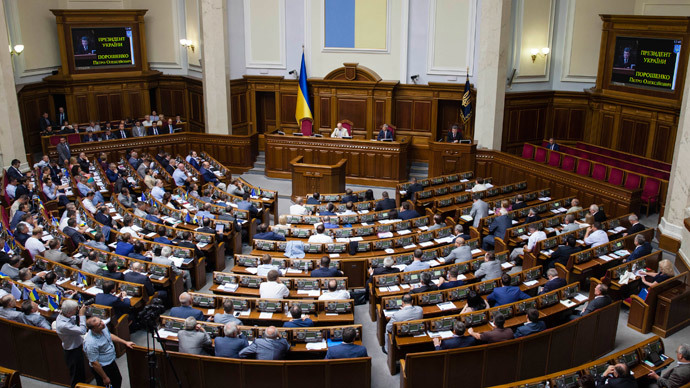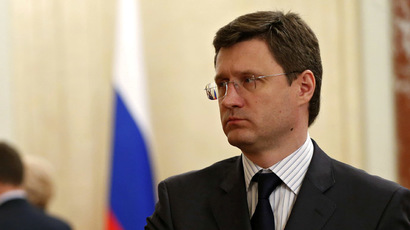Ukraine parliament approves first reading of sanctions against Russia

Ukraine’s Parliament has approved the first reading of an anti-Russian sanctions package that includes 29 measures that are said to be “an efficient reaction to potential threats to national interests and security.”
The bill proposed by the government was passed with 243 votes in favor.
All the amendments could be adopted and go through on a second reading on Tuesday, said Prime Minister Arseniy Yatsenyuk.
Last week Ukraine’s Prime Minister Arseniy Yatsenyuk introduced a bill to parliament sanctioning Russia that included a ban on all transit through its territory.
READ MORE: Ukraine may block all transit from Russia in a sanction row - PM
The bill contained 26 restrictions on Russia, but the most controversial was a ban on energy transit. Yatsenyuk hopes this will help halt his country’s dependence on Russian gas, but the EU might be hurt the hardest. Europe gets about 15 percent of its gas requirements from Russia, with the Baltic States, Finland, Bulgaria and the Czech Republic a hundred percent dependent on Russian supplies.
Gerhard Roiss, chief executive of the Austrian oil and gas company OMV, said on Tuesday that Ukraine stopping transit of Russian gas was an unrealistic scenario.
Experts suggest that ending transit through Ukraine could mean more support for Russia’s South Stream project which has been under EU scrutiny. The European Commission wants project leader Russia’s Gazprom to comply with anti-monopoly legislation.
On Monday Ukraine’s gas monopolist Naftogaz said it would need to sign new transit contracts with companies not on the sanctions list.
The talk was about European firms needing to buy gas from Gazprom at the Russia-Ukraine border, and then transport it via Ukraine, a Naftogaz spokesman explained to RBC. European Energy Commissioner Gunther Oettinger said this option would require trilateral talks.
A search for alternative routes to get Russian gas should also give a boost to another gas pipeline bypassing Ukraine – Nord Stream. Currently it is working at half capacity and a Ukraine transit ban could be the catalyst to have it fully working.
Ukraine imports nearly 50 percent of its natural gas from Russia, which in 2013 amounted to 27.7 billion cubic meters.
In June Gazprom, Russia’s national gas company announced it was stopping deliveries to Ukraine for the ‘chronic’ failure to pay its multi-billion dollar gas bill, but would continue to ship 180 billion cubic meters of gas to Europe.













